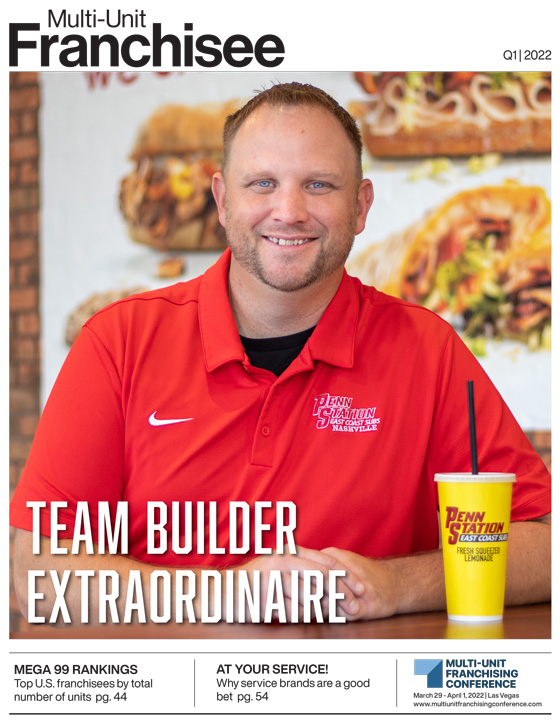Consolidation Trends: How the pandemic is affecting M&A for MUOs

As well as franchisors, operators, investors, and lenders have done adapting to continued evolving conditions since March 2020, labor, commodities, and supply chain issues still remain at the forefront of everyone’s mind. This affects operators and stakeholders not only in assessing their existing operations in conjunction with budgeting and planning for 2022, but also in evaluating new opportunities for both generic growth and acquisitions.
Operators, investors, and lenders are paying attention to what brands are doing well, which operators are outperforming their peers, and the availability of capital. Now with increased concerns and new infection risk related to the omicron variant, the industry is coming to the realization that Covid and the surrounding uncertainty related to the virus will continue to factor into business and acquisition planning for some time. Nonetheless, M&A activity over the past year has been robust, with larger, stronger brands and operators continuing to buy up their competitors and/or fellow franchisees.
Like other changes, such as the explosion of food delivery, that seemingly evolved out of the pandemic, M&A and broader industry consolidation trends within the multi-unit space were already in motion before the onset of Covid. And while the pandemic may not have directly been the cause for these changes, it certainly has accelerated much of the M&A and consolidation activity that the industry has seen over the past year and that the industry will continue to see going forward. Key factors driving consolidation include:
Aging franchise systems. These are long-established legacy brands with aging franchisee bases looking to transition their businesses.
Increasing business complexity. The franchise and multi-unit space have become increasingly complex and difficult with no signs of slowing down. Larger brands and operators with resources in accounting, HR, operations, training, marketing, and development are more adept at dealing with a complex operating environment.
Increased capital requirements/availability. Capital is more readily available and at better terms for larger brands and operators. Banks and other capital providers view that the larger an operator is, the lower risk, and will typically support larger brands and franchisees with remodeling and development requirements, as well as with acquisitions.
Franchisor involvement. Franchisors are more and more involved in driving and steering franchisee-to-franchisee transactions, favoring larger, well-capitalized operators that want to grow markets and develop stores, and influencing buyer pools.
High-level outlook
While the key factors driving consolidation already were in motion before Covid, there is little question that the pandemic influenced and accelerated consolidation trends at a macro level. The multi-unit franchise space effectively experienced three business cycles over the past year. Over that time there have continued to be winners and losers across different segments, geographies, brands, and operators. Some brands and operators managed through the initial waves of Covid, sustained in part by PPP loans and other relief that provided the liquidity needed to remain a going concern. Others thrived, especially those with strong digital platforms, multiple revenue channels, and a profitable off-premise service model (e.g., drive-thru window, curbside carryout, or third-party delivery).
The initial waves of the pandemic were followed by what has been one of the most critical labor shortages in recent memory, forcing operators to modify operations, reduce store hours, or even close certain days altogether. In response, the industry as a whole has been forced to raise wages and provide additional incentives to attract and retain employees.
And, just as operators are trying to manage through the labor shortage, the restaurant industry has been hit with unprecedented commodities and product cost increases caused by inflation and supply chain issues. To counter increased food and labor costs and maintain profitability, the industry has been forced to respond with significant price increases to limit margin deterioration.
These macroeconomic challenges have tested the resolve of many operators and franchisees. For some, their people and teams are tired. The rapidly changing operating environment over the past year and the related pressures and demands have caused some owners to rethink their timetable for an exit. Additionally, as brands increasingly push for new development, they are pressuring franchisees to expand unit counts and are aggressively pushing image and facility upgrades.
While many of the enhancements are necessary as brands look to adapt to a new competitive environment where convenience and experience are paramount, for franchisees considering a sale, these increased capital requirements may ultimately cause them to exit. On the other hand, groups that have the capital and are able and willing to grow are gaining favor with franchisors, who in turn are supporting their growth and consolidation.
In addition to brands and operators, many investors in multi-unit businesses are reevaluating their timetables, growth objectives, and liquidity alternatives. Many franchises and multi-unit businesses have multiple owners with different ages, risk tolerance, and outlooks for the future. In most cases, the pandemic has increased conversations—and often divisions—on growth, liquidity timing, etc.
While nobody can say for certain what the future holds, it is safe to assume that the consolidations trends that everyone has seen pick up over the past year will continue into the future at all levels.
Carty Davis is a partner with C Squared Advisors, a boutique investment bank that has completed hundreds of transactions in the multi-unit franchise and restaurant space. Since 2004 he’s been an area developer for Sport Clips in North Carolina with more than 70 units. Contact him at 910-528-1931 or carty@c2advisorygroup.com.
Share this Feature
Recommended Reading:
Comments:
comments powered by DisqusFRANCHISE TOPICS
- Multi-Unit Franchising
- Get Started in Franchising
- Growth
- Operations
- Open New Units
- Leadership
- Marketing
- Technology
- Legal
- Awards
- Rankings
- Trends
- Featured Franchise Stories
FEATURED IN

Multi-Unit Franchisee Magazine: Issue 1, 2022
$150,000




 The multi-unit franchise opportunities listed above are not related to or endorsed by Multi-Unit Franchisee or Franchise Update Media Group. We are not engaged in, supporting, or endorsing any specific franchise, business opportunity, company or individual. No statement in this site is to be construed as a recommendation. We encourage prospective franchise buyers to perform extensive due diligence when considering a franchise opportunity.
The multi-unit franchise opportunities listed above are not related to or endorsed by Multi-Unit Franchisee or Franchise Update Media Group. We are not engaged in, supporting, or endorsing any specific franchise, business opportunity, company or individual. No statement in this site is to be construed as a recommendation. We encourage prospective franchise buyers to perform extensive due diligence when considering a franchise opportunity.